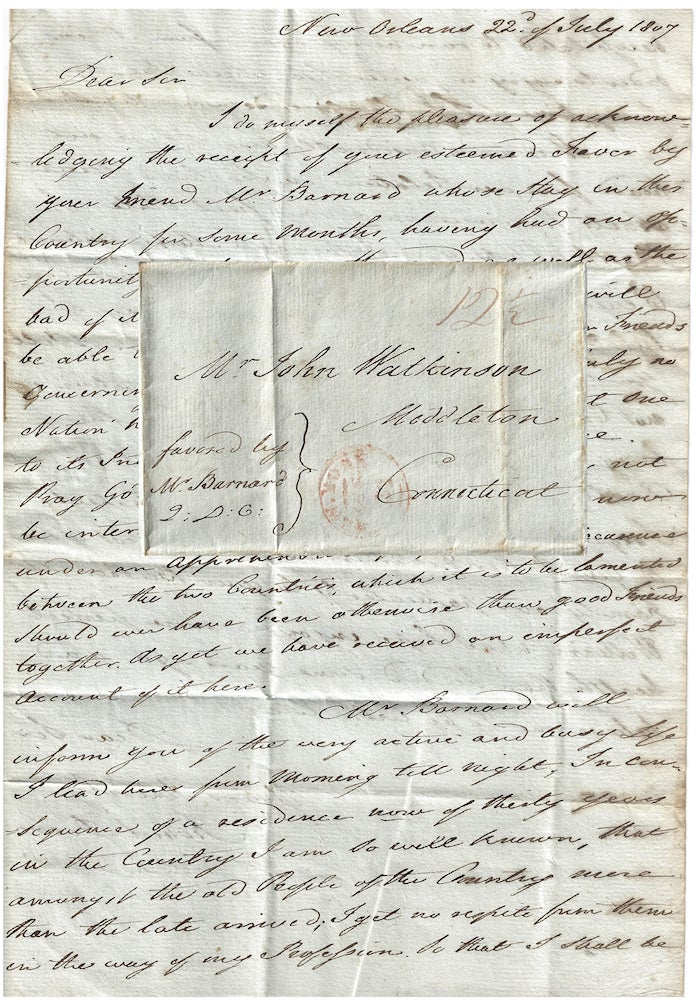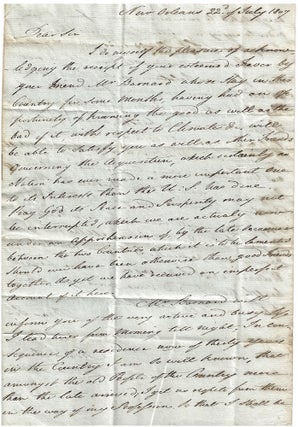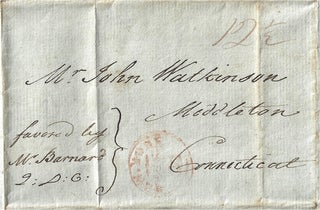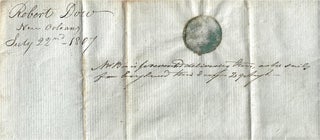1807 – Letter from a renowned New Orleans surgeon, mentor of the first trained African-American physician in the United States and an associate of Aaron Burr and John Wilkinson, expressing both admiration for and doubt about the Louisiana Purchase
New Orleans: 1807. Envelope or Cover. This 1807 two-page stampless folded letter, measuring 16” x 11¾“ unfolded, was sent by Dr. Robert Dow, a long-time Scottish immigrant, living in New Orleans, Louisiana Territory, to John Watkinson at Middletown Connecticut. The letter was carried to New York as indicated by the annotation, “favored by Mr. Barnard” where it was placed into the mail system. It bears a circular 22 August New York postmark in red and manuscript rate marking, “12½“, which at the time was the cost to send a letter between 90 and 150 miles.
In this letter, Dow expresses both admiration for the Louisiana Purchase as well as concern about potential international complications.
““Concerning the Acquisition, which certainly no Nation has ever made a more important one to its Interests than the U.S. has done. Pray God its Peace and Prosperity may not be interrupted, which we are actualy under an apprehension of by the late because between the two Countries, which it is to be lamented should ever have been otherwise than good Friends together. . ..”
Dow, a Scottish-born physician, arrived in New Orleans, which was then part of New Spain in 1776. Considered to be the outstanding tri-lingual (Dow was also fluent in Spanish and French) doctor in Louisiana, he was appointed by Governor-General, Bernardo Galvez, as the medico of the Royal Hospital. Dow avoided the extreme medical treatments use at that time, e.g., bleeding, blistering, sweating, and only occasionally purging his patients. He was so highly regarded that President Jefferson recommended his appointment to the new Louisiana Territory’s first governing council. In this letter, Dow reports that professional popularity had drained his strength.
““Mr. Barnard will inform you of the very active and busy life I lead here from morning to night. In consequence of a residence more than thirty years in the Country I am so well known, that among the old People of the Country more than the late arrived, I get no respite from them in the way of my Profession. So that I shall be recepitated to run away again from it in order to enjoy a quieter life which One at my time of Life should endeavour to attain. . ..”
Dow had hosted the traitors, Vice-President Aaron Burr and John Wilkinson (Senior Officer of the U.S. Army and future Governor of the Louisiana Territory) during their visits to New Orleans earlier in the 1800s as President Jefferson contemplated the Louisiana Purchase. When coupled with Dow’s “apprehension” about the Louisiana Purchase, this suggests it might have been possible that he was at least sympathetic to their treasonous plot to separate Louisiana from the United States and rule over it as an independent nation.
Dow was also the mentor of the first trained black physician, James Durham, to practice in the United States. Durham was born a slave and served as an apprentice to a Loyalist physician, John A. Kersley. After Kersley died in prison, Durham’s ownership transferred to George West, a British Army surgeon. West’s regiment was transferred to Pensacola in British Florida, and after English forces were defeated by Galvez in 1781, Durham was apparently claimed as a spoil-of-war and sold to Dow in New Orleans. Recognizing Durham possessed nearly all the qualifications of a physician, Dow completed his training and, for $500, freed Durham in 1783, after which he became his professional patron. Durham was earning approximately $30,000 by 1788. He traded correspondence with Dr. Benjamin Rush in Philadelphia, and after New Spain forbade medical practice by non-degreed physicians in 1801,, Durham relocated to Philadelphia.
John Watkinson, the addressee of this letter, was part of the Watkinson clan that immigrated to the United States in 1794 and played a principal role in establishing Connecticut as a major center in the American textile industry.
. Very good. Item #009953(For more information, see Interim Appointment: W.C.C. Claiborne Letter Book, 1804–1805 edited by Jared W. Bradley, “Spanish Siege of Pensacola Begins” at the History.com website, Nakamaya’s Black Surgeons and Surgery in America, Hanger’s A Medley of Cultures: Louisiana History At The Cabildo, and a James Wikinson Letter sold as Lot 487 in the Neal Auction of 16-17 July 2016.)
Exceptionally scarce. At the time of listing, no Robert Dow items are for sale in the trade. Only two Robert Dow items have ever come up for auction per the Rare Book Hub, a letter of introduction sent to him for Aaron Burr’s partner in crime, John Wilkinson, and an oil portrait by Jose Francisco Xavier de Salzar Y Mendoza.. No Robert Dow items are held by institutions per OCLC.
Price: $1,000.00









